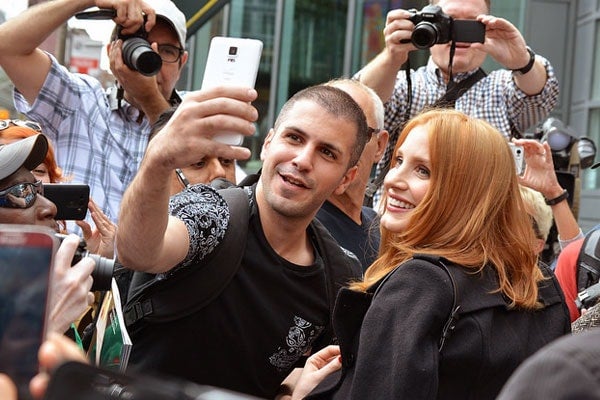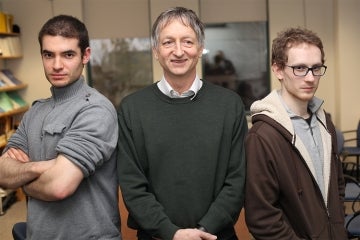
TIFF 2015: U of T insiders offer tips on getting the most out of movies – at the festival and all year round
Published: September 15, 2015
One of the world’s largest film festivals, TIFF offers the chance to see feature films, shorts and documentaries from around the world – and from the students and alumni of the University of Toronto.
This year's selections include Remember by acclaimed, veteran filmmaker and alumnus Atom Egoyan (Adoration), and Len and Company, co-written and directed by alumnus Tim Godsall. Moviegoers can catch Avi Lewis’ This Changes Everything, based on alumna Naomi Klein’s book of the same name, as well as Something Horizontal, an experimental short film by PhD student Blake Williams.
TIFF is also a chance to join experts from U of T's Munk School of Global Affairs as they provide insights into the complex issues at the heart of movies sourced from across the globe. You can see Stephen Toope, Ron Levi, Janice Stein, Robert Austin, and Robert Steiner discuss Australian, French/Algerian, Turkish, Moroccan and German productions.
U of T News writer Veronica Zaretski interviewed TIFF Artistic Director and U of T Sessional Lecturer Cameron Bailey about the significance of the festival. (Read the interview.)
She also spoke with three TIFF insiders, all U of T alumni, on resources for cinephiles, films to watch and why Toronto is a playground for art and culture aficionados.
“We are incredibly fortunate in Toronto to have so many cultural institutions, so many film institutions. Our audiences always come up with really informed and fun questions,” says alumnus Theresa Scandiffio, director of adult learning at TIFF. “We never take our audiences for granted.”
The learning resources at TIFF are diverse and offer a great opportunity for students, Scandiffio says.
“We have the Higher Learning programming for university and college students to get access to luminaries in the field – scholars and filmmakers,” she says. “The TIFF Light Box programming really values student participation. We also have The Higher Learning Digital Resource Hub. It’s free and we love for people to have the resources that they need with such easy access through the hub.”
Scandiffio says the hub provides satellite educational programming to academic communities and the public, including videos of Higher Learning events and research materials from TIFF’s film reference library.
Graduate students can also apply starting September 25 to the Jeffrey and Sandra Lyons Canadian Film Scholarship. The opportunity grants one student the opportunity to participate in the Higher Learning program and access to the extensive resources at TIFF’s reference library.
Scandiffio says her interest in film education flourished at U of T – she graduated with a BA in cinema studies in 1999, before continuing to postgraduate studies.
“U of T gives an incredibly solid grounding in cinema and media history and theory,” she says. “I was prepared for a formal analysis in film editing and media literacy. That kind of grounding is a key to what we do in our programming. It gives us a sense of what to look for.”
“It was actually at U of T that we were encouraged to see films in the city, at films festivals, at art and talks taking place outside of the classroom and at cinemas across the city.”
Scandiffio says favourite moments from her career at TIFF include bringing in guests such as director Guillermo del Toro (Pan’s Labyrinth, Pacific Rim) to teach a master class, and organizing a repeat speaker series collaboration with U of T’s Munk School.
“We’re matching Munk School academics with talented filmmakers around current political and social economic issues and that’s always electrifying,” Scandiffio says.
“It demonstrates how you can use film when subject experts are paired with film experts – a really powerful combination. You can point to how film and media are used to convey really strong messages the audience can take with them to drive social change. It demonstrates how you can merge art experts and politics experts to really make a change.”
If you’re shopping for last-minute tickets for promising Canadian selections, you can thank Magali Simard for the breadth of options. Simard programs Canadian features for the festival and new releases for TIFF Lightbox throughout the year. Ten years ago, she moved to Toronto from Montreal to study at U of T and since graduating in 2006 she says she hasn’t looked back.
“The industry is very wide here,” Simard says. “When I started [studying cinema studies] I wasn’t sure if I would end up in academia or film production. Being a part of TIFF came really quickly. U of T is an amazing place – I’m still in touch with a lot of the faculty. It’s really close to me.”
Simard says that when she first moved to Toronto, she was sure that she wanted to work in the film industry, in part because of the cultural vibe of the city.
“I think U of T and TIFF connect people really well. It’s vital to be instrumental in making these connections, and I get to be the matchmaker, for the industry but also for the audience,” she says. “I feel very lucky. There’s no better feeling than loving a film and then sharing it with the audience. And we want to help bring the films, and definitely Canadian films, to Toronto and to the world.”
Kiva Reardon, a programming associate at TIFF, graduated from U of T with a Master of Arts in cinema studies in 2012. After the Festival, she will be programming a series, “Beyond Badass: Female Action Heroes”, at the TIFF Bell Lightbox in October.
“I took a class with Corinn Columpar that shaped my critical sensibilities, and taught me to learn how to re-watch films. That class informed critical thought about performances, and especially representations of gender on film and gender and equity in film.”
She now also runs cléo, an online journal that’s informed by feminist perspectives. She met and collaborated with fellow classmates Mallory Andrews and Julia Cooper in Columpar’s graduate seminar, Cinematic Bodies, and all three are now working on the journal.
“The idea behind Beyond Badass is to think about female action heroes critically, and as more than babes in spandex. My interest is informed by Corinn’s class; there’s a lot about thinking about physicality and especially female physicality,” says Reardon.
And while it’s hard to narrow down a few favourites with so many selections, Simard and Reardon highlighted a few films to watch for during the festival and after. For local talent, Simard points out Torontonian Andrew Cividino’s Sleeping Giant and Hurt, the documentary about Steve Fonyo by Alan Zweig (When Jews Were Funny). She also suggests Anne Émond’s Les êtres chers (Our Loved Ones).
“The film has an incredible cast and astute writing,” says Simard.
Reardon recommends Ben Wheatley’s (Kill List, A Field in England) High Rise, part of the Platform programming of emerging talent, and Meghmallar, part of the Discovery Program, a Bangladeshi film about the liberation war. “It’s a quiet and cinematic film with a water motif and a feeling of entrenchment,” she said.
George Amponsah’s (The Fighting Spirit) documentary, The Hard Stop, about the life and death of Mark Duggan, and the London riots of 2011 is highly recommended.
“It’s a really cinematic documentary – it’s not a lot of talking heads,” she says. “The film is about the aftermath of the shooting and the daily struggle of dealing with racial tensions.”
Indicative of Toronto’s thirst for cinema, there will be no shortage of films to watch or cultural events to attend this season, says Scandiffio.
“Toronto is a truly cinematic city. Whether at TIFF, or during Nuit Blanche, the city comes alive. Some of the audience are professional curators, but there are also a lot of people who are there as viewers. It gets you really engaged in the city.”



